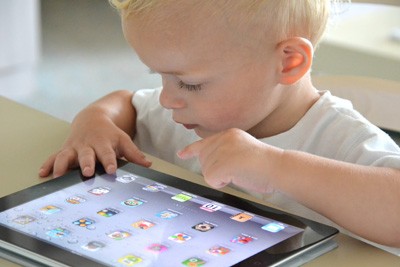
The Neag School of Education presented its first “Teaching and Learning with iPad Conference” in May to a sold-out crowd of 400 educators, administrators and learning technology enthusiasts.
Organizer Del Siegle, Ph.D., chair of Neag’s Department of Educational Psychology, said the conference was designed to provide practical tips to educators on how to teach with this “exciting technology.”
“I wanted to show that the Neag School of Education and the Department of Educational Psychology were interested and involved in cutting-edge educational innovations,” said Dr. Siegle.
While Siegle took a leadership role with the conference, other groups were involved as co-sponsors, including Connecticut Educators Computer Association (CECA) and The UConn Chapter of Phi Delta Kappa International (PDK), which helped move the event forward and get out word about the first-time event. Siegle also wanted to make a concerted effort to share the department’s expertise with the education community, while providing a forum for educators to share their experiences with iPads. Personal experience also encouraged his interest in the technology.
Siegle, who has been using an iPad for about a year, said he’s been impressed with the technology, as well as has noticed an increase in use among UConn colleagues. He’s also been amazed at his two young children’s attraction to it and the smaller iTouch.
“They began using them independently at home and without any instruction,” noted Siegle. “I had shown my daughter, Jess, a jigsaw puzzle app, which she enjoyed. Then one day my wife, Betsy, noticed that Jess was completing puzzles by herself. She asked if I had turned on the iTouch and opened the app for Jess. I had not.”
“Both of us were surprised that she had mastered those skills by simply observing me a couple of times. The pattern repeated with our son, Del. Before he was two years old, he had also independently mastered using the iPad,” continued Siegle. “These experiences convinced me that this was a very powerful learning tool that educators needed to be well-versed in using.”
The iPad, he said, is “an intuitive tool that young people seem to instinctively understand” and an important piece of technology for today’s educators to explore.
“The plethora of apps that are readily available really do allow teachers to teach in a different way,” he noted. “With the iPad, we can create exciting learning environments that promote creativity, problem solving and critical thinking–skills that are essential in the technology- and data-rich environment young people are growing up in.”
When they began organizing the conference, Siegle and others had hoped for 100 participants. They had to stop registration two weeks early when it hit 400.
“The response was gratifying and overwhelming,” Siegle added.
The conference also provided the opportunity to formally introduce a new Neag School program: Cognition, Instruction and Learning Technologies. Coordinated by Scott Brown, the program merges two previous programs, Cognition and Instruction with Learning Technology. There were also promotional opportunities for Two Summer MA in Learning Technology, led by Mike Young.
Plans are already being made for a follow-up conference on Saturday, Sept. 29, 2012.
Titled “Teaching and Learning with iPads: Apps Applied,” the conference will give educators the opportunity to bring their iPads and work directly with specific apps. Attendees will not just hear how educators are using specific apps in learning situations, but have the chance to use them.
“I believe this hands-on approach is unique for a conference, and should enable participants to feel comfortable with the technology and effectively use it to promote student learning in their classrooms,” Siegle said. “It’s pretty exciting.”
Details about the Sept. 29 conference, including how to register, will come soon.
 Facebook
Facebook
 Twitter
Twitter
 LinkedIn
LinkedIn
